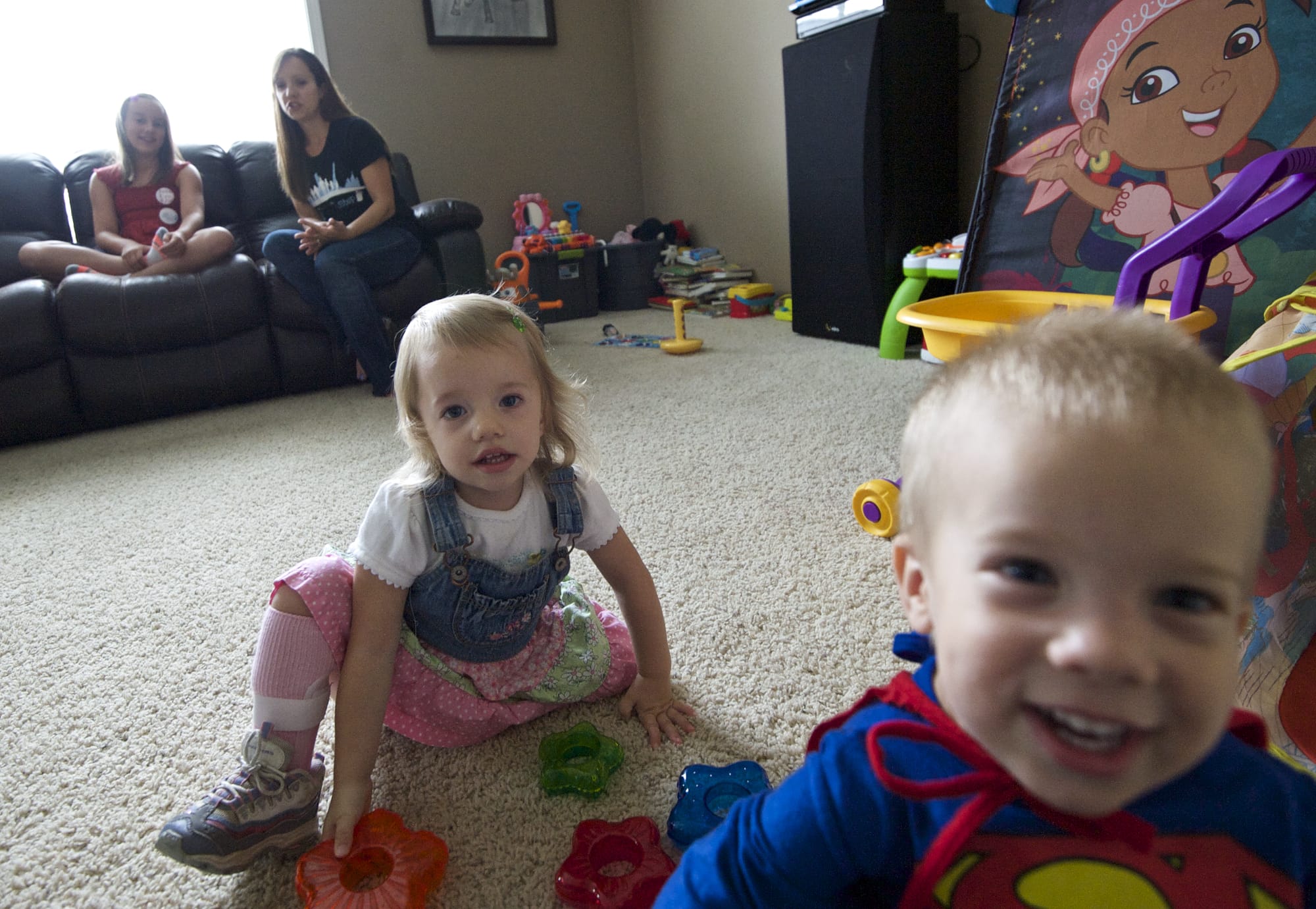Eva Jensen of Ridgefield is a sweet, fun-loving 2-year-old.
She’s patient and friendly. She can get angry easily, but she forgets quickly. She’s unsteady as she walks. She’s learning new words.
o The Jensen family is raising money for the Foundation for Prader-Willi Research. They held a 5K run/walk last month that raised nearly $11,000. All of the money will be used to fund Prader-Willi syndrome research.
o Donations can be made through December on the fundraiser website.
Her twin brother, Gus, tends to irritate her from time to time. Her big sister, Lilly, 9, and big brother, Gunnar, 5, are her biggest supporters.
In the next couple years, Eva will begin to face the reality of the genetic disorder she was diagnosed with as a newborn.
Eva will begin to experience uncontrollable hunger. The lack of satiety, even after eating meals, will likely lead to behavior problems when Eva isn’t allowed unlimited access to food.
She’ll have scheduled meal and snack times to provide stability. She’ll get smaller portions since her metabolism will be slower than that of most children. She may also face a variety of other developmental and mental problems.
But her family is full of hope for Eva.
“We think that she can have a bright future,” said Ronda Jensen, Eva’s mother. “We have to believe that. If you don’t, what kind of present do you have?”
Prader-Willi diagnosis
Eva was diagnosed with Prader-Willi syndrome — a genetic disorder occurring on chromosome 15 — when she was 3 weeks old.
With the exception of genes related to sex characteristics, all genes come in pairs — one set from the mother, one set from the father. Prader-Willi syndrome occurs because certain paternal genes that should be expressed, or active, are not for one of three reasons: the paternal genes on chromosome 15 are missing; the child inherited two copies of chromosome 15 from the mother and none from the father; or there is an error or defect in the paternal genes on chromosome 15.
In Eva’s case, she inherited two copies of chromosome 15 from her mother. That reason accounts for about 30 percent of Prader-Willi cases, Jensen said.
According to the National Institutes of Health, Prader-Willi syndrome affects 1 in 15,000 to 30,000 people.
Eva showed signs of Prader-Willi at birth.
She was born with low muscle tone and initially lacked the strength and coordination to suck or swallow. For the first six months of her life, Eva required a feeding tube. Eva also has almond-shaped eyes — another trait of kids born with Prader-Willi.
Doctors told Ronda and her husband, Mark, that Eva could have various muscle conditions or, possibly, Prader-Willi syndrome.
“I had never heard of it,” Jensen said.
But after a little research, the Jensens were convinced Eva had Prader-Willi syndrome. A genetic test confirmed it.
“It was almost a relief just because we had a plan of action,” Jensen said. “We knew what we could do for her.”
Food-seeking
Eva is a good eater. She’s always ready for mealtime, and she finishes all of the food on her plate.
But she hasn’t yet shown any food-seeking behavior, such as trying to get into the cupboards or sneaking food.
That behavior may begin soon, though.
Children with Prader-Willi tend to begin food-seeking behavior between ages 2 and 5, Jensen said. With it, often comes behavior problems, such as tantrums, when the child is denied food, she said.
Children with Prader-Willi also often experience developmental delays. Eva currently goes to physical therapy and wears braces to support her weak ankles.
So far, Eva isn’t too far behind developmentally. That’s probably partly because she’s trying to keep up with her twin brother, Gus, Jensen said.
Eva was crawling by 13 months old; kids with Prader-Willi are typically 18 to 20 months old before they start crawling. Eva also started walking earlier than most kids with Prader-Willi, 19 months rather than 2 years old.
In addition to physical therapy, Eva is also undergoing growth hormone therapy that she will continue into adolescence. Children with Prader-Willi burn calories at just 50 to 60 percent the rate of children without the syndrome. The hormone therapy helps to speed up the metabolism, Jensen said.
Eva also undergoes annual sleep studies to check for sleep apnea and has a back X-ray every year to check for signs of scoliosis. Her body also struggles to fight off illnesses and doesn’t regulate temperature well.
Eva may face additional struggles as she grows older.
Kids like Eva who have Prader-Willi caused by two copies of their mother’s chromosome are more likely to be autistic, but they also tend to have a higher verbal IQ, Jensen said.
Eva will also likely struggle with controlling how much food she eats. It’s possible the Jensens will have to put locks on their cupboards and refrigerator to keep Eva from overeating.
The insatiable appetite can lead to obesity and obesity-related complications, such as Type 2 diabetes, heart disease, stroke and sleep apnea.
“It’s possible that they can sit and eat themselves to death,” Jensen said.
People with Prader-Willi syndrome don’t just feel as though they’ve missed one meal. Rather, they feel like they’ve gone without food for days, Jensen said.
Jensen hopes promising research will lead to treatments for children with Prader-Willi and other eating disorders. Treatments that will allow Eva to live a more independent life.
“We believe they will find a treatment for hyperphagia, the hunger,” Jensen said. “We have to believe that.”
To support that research, the Jensens held a fundraiser 5K last month. More than 70 people attended the inaugural event, which raised more than $11,000 for the Foundation for Prader-Willi Research.
While the research is promising, Jensen said she and her husband try not to think too far into the future.
“We worry about right now. We worry about tomorrow,” she said. “Next year and the years that follow, we’ll worry about later.”




